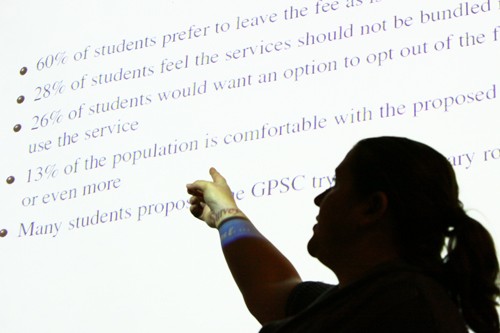GPSC President Emily Connally says the majority of UA graduate students would be negatively impacted by proposed increases to institutional fees next year.
Her position is supported by the results of the Graduate and Professional Student Council’s Fee Impact Survey, which was conducted from early October until Nov. 8. Connally released the survey results during a meeting of the UA Faculty Senate on Monday.
About 20 percent of UA graduates, 1,697 students, responded to this year’s survey. This included at least 10 responses from each college represented by GPSC.
A full 90 percent of survey respondents said they would be impacted by the current proposed fee increase, which would raise fees for full-time students to $933 a year, a $310 increase over this year’s fee.
The majority of that amount would come from increases to the Library and Technology Fee, which funds maintenance for the UA’s library system and related technological components, and the Health and Recreation Fee, which primarily funds services provided by Campus Health Service and the Student Recreation Center.
Connally raised issue with how some of the fees are bundled together, particularly the Health and Recreation Fee. Half of survey respondents said they have never used the Rec Center, and 48 percent said they would opt out of any fee that goes to the center’s facilities. Also, 90 percent said they had never used services offered through the Rec Center, such as club sports and fitness courses, and 77 percent said they would opt out of this portion of the fee.
Connally said it was GPSC’s position that the Rec Center should charge a flat fee for the center, and students who use additional services should be charged a usage fee. Connally also suggested that the fee could be kept at its current level but that students who demonstrate they do not use the Rec Center should be allowed to opt out of paying the fee.
“”Our position is that the Rec Center is a convenience,”” Connally said. “”It may play an important role as a recruitment tool for undergraduates, but it does not hold that same value for graduate students.””
However, graduate students were far more willing to pay fees associated with library use, according to the survey. Sixty percent of respondents said they preferred to leave the fee at its current level and 13 percent said they would be comfortable paying an increased fee for next year. But 26 percent said they would prefer an option to opt out of fees that go to services they do not use, and 28 percent thought the library and technology portions of the fee should be separated.
Some Faculty Senate members rejected the notion of uncoupling the fees.
“”In this day and age, you cannot have a library without a robust IT and technology structure,”” said UA President Robert Shelton.
Shelton praised the study as a whole but said he wondered if students should focus less on paying fees and using services and more on fostering a campus community that benefits the student population. Shelton also drew a parallel to parents who might not want to fund the higher education system after their children are through it.
“”In no way am I trying to demean the study … but it reflects a broader question that is a tough one to answer,”” Shelton said.
Robert Jacobi, an aerospace engineering graduate student and GPSC representative, responded that he did not think a gym membership should be a requirement to get a college degree, especially since many commuter students live too far away to take advantage of some on-campus services.
Connally said that GPSC plans to release a more detailed report on their fee findings in the spring.
Other Faculty Senate business:
The Faculty Senate unanimously voted to approve graduate and undergraduate consent agendas, which included items to change the name of the cell biology and anatomy major to cellular and molecular medicine and offer new degrees in environmental studies and international security.
The senate also unanimously passed a motion to support development of a Distinguished University Fellows program designed to “”strengthen the university’s commitment to multiple strategic goals by building upon the unique and critically valued talents and experience of recently retired tenured faculty.”” The program would enable those interested to continue to contribute to the Arizona university system even after formal retirement from an institution.
Thomas Miller, associate provost for faculty affairs, gave a presentation on the UA’s efforts to demystify the promotion and tenure processes within specific departments and colleges.
From 2009 to 2010, the UA approved promotion and tenure in 97 percent of cases, according to promotion and tenure review numbers furnished by Miller.









